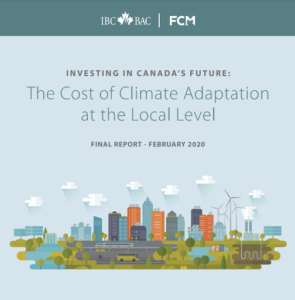
In February 2020, the Federation of Canadian Municipalities (FCM) in conjunction with the Insurance Bureau of Canada (IBC) released a report titled Investing in Canada’s Future: The Cost of Climate Adaptation at the Local Level. The report finds that climate adaptation could come at a cost to Canadian municipalities of $5.3 billion annually. This sizable annual amount was found to be necessary to prevent the worst impacts of climate change at the municipal level. Extreme weather, flooding, erosion and melting permafrost are cited as having the highest adaptation costs. Significant long-term investments are needed to protect Canadians, and our public infrastructure from the escalating effects of climate change in Canada.
As Canada’s Changing Climate Report well describes, Canada has warmed, and will continue to warm at more than double the global rate. Seasonal availability of freshwater in Canada is changing with an increased risk of water supply shortages over much of the country in the summer. Oceans surrounding Canada have warmed and become more acidic and less oxygenated. A warmer climate in Canada, will intensify weather extremes and coastal flooding in many parts of Canada. Canada’s Changing Climate Report was published in 2019 by the Canadian government as a means to inform mitigation and adaptation decision making. The report sought to find how Canada’s climate has changed to date, why, and what changes are projected in the future?
As Canadians face the future uncertainty of the climate crisis, we look to our governmental leaders for action. 60% of public infrastructure is owned and operated by Canadian municipalities. Local solutions to our changing climate are needed urgently. In addition to financial investments to adapt and respond, Canadian municipalities must act quickly to reduce GHG emissions and prevent further climate breakdown.
Long-term investments to protect Canadians, our businesses, our farmland and our public infrastructure are needed, but near term mitigation measures are crucial to preventing and reducing adverse environmental impacts that contribute to our climate crisis. In addition to the urgent need to reduce fossil fuel use, government leaders and environmental policy makers must recognize the significant greenhouse gases that are emitted as a result of our consumption of meat, dairy and eggs. Rigorous scientific analyses have found that between 15% and 30% of global warming today results from the raising and feeding of farmed animals as well as their ‘processing’ and delivery for human consumption. Plant-based diets result in far lower emissions, especially if widely adopted, and are much more sustainable. Utilizing a shift to plant-based diets as a means to reduce greenhouse gas emissions generally comes at a much lower cost than other mitigation and adaptation methods. Environmental policies, that include a substantial reduction of meat, dairy and eggs consumption, would provide considerable mitigation potential and assist municipalities in meeting emissions reduction targets quickly at a lower cost to Canadians.
As our municipalities face the difficult task of responding to the climate crisis, we are optimistic that municipal leaders will adopt innovative measures to protect Canadians. The immense cost of climate adaptation in Canada is concerning. In addition to funding adaptation, governmental leaders should support a shift towards more plant-based diets as a means to reduce greenhouse gas emissions and to maintain resilient, and sustainable communities.